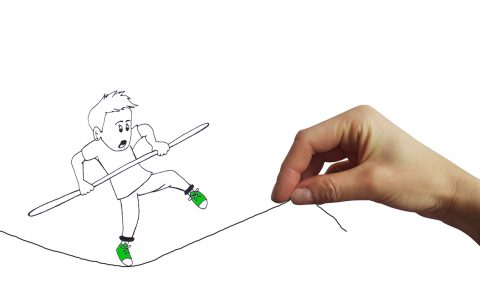Do you get really nervous when the internet is slow? Frenetically push the ‘close door’ button when you are in an elevator? Always in a hurry? Quickly losing your temper? Less decisive than before?
Chances are you are putting more demands on yourself than is ideal, pushing yourself so hard that you arrived in the unsustainable zone of ‘diminishing returns’.
It’s time to take action and get your life in balance again. Defining your list of ‘personal operating principles’ will prove very effective.
Most of us want to be successful in our careers, not to say in all areas in our lives. Growing up we have learned that success comes from hard work – and thus deep in our heart, we consider we can ‘have it all’ if we just work hard enough. So that’s what we do: work really hard.
Unfortunately that method proves ineffective – it’s not working hard that will get you to results (working too hard leads to 0 results) – what matters is working smart.
And that’s very personal: some people work better in the morning, others work better at night; some work better alone, others prefer to work in tandem; some like to change their work environment, others feel productive in one setting only.
In order to work smart, it’s important is to find out what gives you energy and productivity – and what drains you of it. Once these elements are clear to you, you can define a short “I will” and “I won’t” list:
Your “I will list” is the list of principles that help you perform ‘at top level’. Examples we borrowed from CEOs and senior executives we’re working with include “I will start each day with 1 hour of important content work (rather than start my day with replying to e-mails)”; or “I will delegate the handling of my e-mails to my executive assistant”; or “I will take a 5 minute break between 2 meetings”. The items on your “I will list” are there because you have noticed they get the better out of you and the results you create.
- Your “I won’t list” is a response to those elements that drain your energy, and make you less effective and productive than desired. By deciding to put these elements on your “I won’t list”, again you set yourself up for more fulfillment and results. Some executives we know put the following rules on their list: “I will not take a plane leaving before 8 AM”; or “I will not work during the weekend”; or “I will not have more than 2 business lunches per week”.
Developing these two lists will prove extremely useful, as they provide tremendous clarity, both for yourself and for the people you decide to share this list with. And that clarity is power. Getting and staying in ‘the productive zone’ will become so much easier.
If you would like to know more about this topic, develop your time management skills during our boost seminars, coaching programs and development trainings, contact us!
